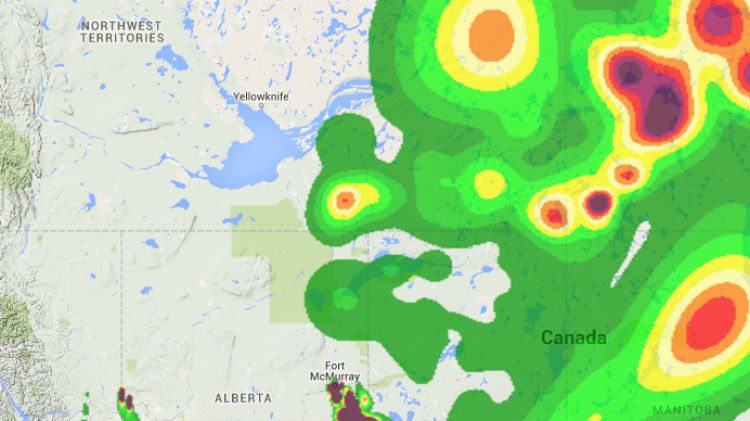The territory’s chief public health officer is warning residents along the Alberta border of complications that can arise from smoke inhalation.
Dr. André Corriveau issued a public health advisory Saturday warning residents in the Thebacha region of poor air quality because of the Fort McMurray wildfire.
Read: Ground Conditions Dry In Yellowknife As Fire Season Begins
The advisory applies to residents in Fort Smith and the Salt River reserve in particular.
While there are no wildfires burning in the region, winds have carried smoke from fires in northern Alberta into southern portions of the NWT.
The amount and duration of local smoke will depend on wind direction and speed, according to Corriveau.
The territory’s top doctor says residents in the Thebacha region may experience symptoms such as increased coughing, throat irritation, headaches or shortness of breath caused by smoke.
Children, seniors, and those with cardiovascular or lung disease are especially at risk.
Read: NWT Offers Support To Those Affected By Fort McMurray Fire
Corriveau says the smallest particles within smoke make up the unhealthiest material because they go deeper into the lungs, making it harder to breathe.
If smoke becomes a problem in your community, it’s recommended that you:
- Stay inside as much as possible, with the windows and doors closed
- Don’t smoke and stay away from people who do
- If you have room air cleaners with HEPA filters, turn them on
- Don’t use wood stoves, gas stoves and even candles as they can make indoor air quality worse
- When you’re in a car or truck, keep the windows closed and put the air system on “recirculate”
- Have several-days’ supply of nonperishable groceries that do not require cooking, since cooking can add to indoor pollutant levels
- Drink lots of water so that your nose and mouth are kept moist for easier breathing
- Be alert to public service announcements
- Be aware that outdoor events may be postponed or cancelled if smoke levels become elevated
- If you experience chest tightness, chest pain, shortness of breath or severe fatigue, talk to your community health nurse or doctor
- Avoid working or exercising outside, and stop if it makes you feel tired. Limit the amount of time your children play outdoors
- If you have neighbors, friends or relatives that live alone, check periodically to make sure they are okay. Elders and people with heart or lung conditions may get sick from the smoke. When doors and windows are kept closed to keep the smoke out, houses may also get very hot. This can lead to heat exhaustion or heatstroke. Use fans to move air around inside the house
- Most masks are not helpful. The harmful particles are so small they can go right around or through them. Staying indoors with the windows closed remains the best option
Meanwhile, people with heart or lung conditions can also do the following:
- Be especially careful about monitoring your condition. Take all of the medicine you are supposed to, and do everything your nurse or doctor tells you to do. Make sure you have a week’s supply of your medication available
- If you plan to use a portable air cleaner, buy one appropriately matched to room size, as specified by the manufacturer, before a smoke emergency occurs
- Talk to your nurse or doctor if you have any other concerns about your health




